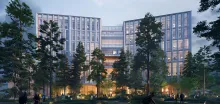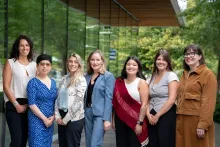
Now in its ninth year, the Sea to Sky Aphasia Camp continues to be a sought-after interprofessional learning opportunity across the UBC campus.
The camp is planned and delivered through the School of Audiology and Speech Sciences in collaboration with the March of Dimes Canada and Douglas College. Working with UBC Health, approximately 30 students from a range of Health and Human Service programs register for this IPE immersion activity.
To participate, students spend a weekend as camp facilitators to a group of 30 campers with aphasia and their family members. Specific learning objectives include interprofessional competencies such as:
- interpersonal and communication skills,
- patient-centred and family-focused care and
- collaborative practice which includes collaborative decision-making, roles and responsibilities and team functioning.
In addition to interprofessional competencies, students are also expected to:
- Develop an awareness and understanding of the impact of living with aphasia
- Develop communicatively accessible strategies (e.g. supported communication) for communicating with adults with language difficulties such as aphasia.
Camp activities are carefully and purposefully planned over the duration of the weekend to create significant learning opportunities for students to interact with clients with aphasia, family members as well as their student peers.
What your students experience over the weekend:
- Pre-Camp Training:
In preparation for the weekend, students undergo training specific to working with people with aphasia in a community setting (including supported communication training, in line with the Canadian Stroke Best Practice Guidelines), as well as engaging in activities designed to promote interprofessional collaboration. This past year, the pre-camp training included a series of online training resources that were delivered to students in the weeks leading up to an in-person orientation evening. Feedback from students on the training provided was extremely positive, rated as particularly relevant to their future practice.
- Teamwork
Students are divided into multidisciplinary teams for the weekend, and these teams are matched with a group of campers with aphasia. Team challenges and activities are set, culminating in a performance on the last day. Emphasizing the importance of teamwork serves three purposes over the camp weekend:
- Promotes ongoing collaboration between students across the health disciplines relating specifically to their group of campers and their group of campers’ needs
- Supports campers to develop relationships and rapport with other people with aphasia. Given the isolating nature of aphasia, the importance of new relationships is highlighted to students, and they are coached to facilitate and encourage these important connections.
- Enables students to understand the impact of chronic disability on family and friends, through connecting family members with each other to support and learn from their shared experiences.
- Evaluation
Evaluation and feedback regarding student participation is provided by Clinical Team Leads throughout the weekend. The Team Leads meet regularly with students both in teams and individually. The evaluation and feedback provided explores the students’ experience both working within their teams, as well as their role with the client. With guidance from the clinical faculty, students are continuously negotiating their roles, asking questions of and seeking information from one another, to ultimately reach an understanding of the diverging and converging nature of each other’s scope of practice.
Recruiting for 2018 and beyond: Are you interested in becoming a Clinical Team Lead?
Critical to the success of the camp weekend are the clinicians in the community who attend as Team Leads for the weekend. The clinicians who volunteer their time also come from a range of health professions, ranging from Occupational Therapy and Physiotherapy, to Therapeutic Recreation, Nursing and Speech-Language Pathology, to name but a few. Team Leads offer support and guidance to a small group of approximately 6 students over the duration of the weekend. In their role, they facilitate debriefing discussions between students, while also encouraging student reflection and evaluation. We are recruiting to increase our number of Clinical Team Leads, and if this opportunity is one that interests you, please contact Eavan Sinden at esinden@audiospeech.ubc.ca.
*If inquiring about the Aphasia Camp on behalf of a client, or for further information on how you can register a client, please contact Eavan Sinden at aphasiacamp@audiospeech.ubc.ca.



